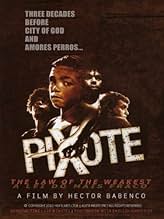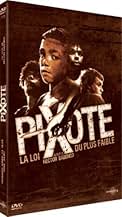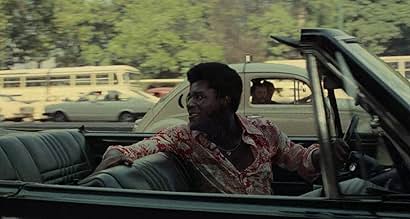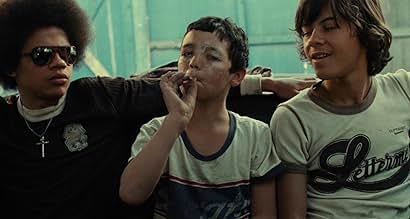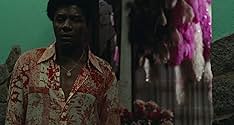IMDb RATING
7.9/10
10K
YOUR RATING
The life of a boy on the streets of Sao Paulo, involved with crimes, prostitution, and drugs.The life of a boy on the streets of Sao Paulo, involved with crimes, prostitution, and drugs.The life of a boy on the streets of Sao Paulo, involved with crimes, prostitution, and drugs.
- Awards
- 10 wins & 4 nominations total
João José Pompeo
- Almir
- (as Joáo José Pompeu)
Rubens Rollo
- Director
- (as Ruben Rollo)
Luis Serra
- Reporter
- (as Luiz Serra)
Featured reviews
10jeek
"Pixote" is the one of most powerful, shocking, and moving motion picture to come from Brazil. It's about the lives of street kids on the streets of Sao Paulo and Rio De Janeiro, and it centers around a ten-year-old boy. The camera follows them around in an almost documentary style;from the juvenile detention center (where most of the staff is as corrupt as the police) and back to the streets, and it never turns away from the horrors of the city. Prostitution, drug use/dealing, corruption, and murder are all witnessed by these youths; yet it's something they're painfully used to. Director Hector Babenco used real street kids as the actors, adding to the films brutal reality. Although not for everyone, a film I highly recommend. An emotionally devastating movie.
Perhaps the most brutal filmic portrait of youth ever made; Charles Dickens meets Hieronymous Bosch in this tale of a group of boys struggling to survive in the reformatories and mean streets of Brazil as the cycle of prey transformed into predators is documented.
The saddest detail is to realize that this film, made almost twenty five years ago, documents a world that in terms of its poverty and depravity, has apparently changed very little. A brutal reality captured here but with some of the most layered acting I've ever seen in the history of film by a group of amateurs picked from the streets of Sao Paulo with no previous experience. Not one or two good performances, the entire cast is quite simply remarkable, and even sadder is the fact that most of them have probably now been swallowed by the street life they portrayed.
Not as sophisticated a vision as Bunuel's 'Los Olvidados' or as sensational as Clarke's 'Kids,' but in this genre of 'children growing up in the streets' it is easily the most emotionally powerful film of them all.
The saddest detail is to realize that this film, made almost twenty five years ago, documents a world that in terms of its poverty and depravity, has apparently changed very little. A brutal reality captured here but with some of the most layered acting I've ever seen in the history of film by a group of amateurs picked from the streets of Sao Paulo with no previous experience. Not one or two good performances, the entire cast is quite simply remarkable, and even sadder is the fact that most of them have probably now been swallowed by the street life they portrayed.
Not as sophisticated a vision as Bunuel's 'Los Olvidados' or as sensational as Clarke's 'Kids,' but in this genre of 'children growing up in the streets' it is easily the most emotionally powerful film of them all.
The violent death of Fernando Ramos Da Silva only eight years after the completion of this film, only adds to the poignancy of dierector BAbenco's powerful message. The film is split into two halves - the first in a reformatory where a group of youngsters are abused and violated by the violent law enforcers and guardians. The second backdrop is the city where they are confined instead by their own actions and morality, which includes mugging, pimping and killing different characters who enter their lives.
The differing gender and sexual roles in the film allow for constant changes in the characters as they interact with other people. Particularly interesting is teh character of Lalica, a transvestite who is mother and lover to some of the children. Her reaction to the arrival of Sueli, a prostitute is both poignant and tragic.
There is no happy ending to this story and i reccomend to watch it with caution as there are some very uncomfortable scenes to watch especially in teh opening twenty minutes. But whilst watching it, it is important to remember that this is not just a fictional tale. The actors are not trained professionals but instead boys selected from the streetsof Sao Paulo. They actually lived this life that is portrayed so vividly on screen and in da Silva's case, died at the hands of the police who are depicted so brutally. A documentary? A piece of fiction. It borders on both but it certainly makes for heart wrenching material and is a film that actually leaves you breathless and thinking long after having watched it.
10/10
The differing gender and sexual roles in the film allow for constant changes in the characters as they interact with other people. Particularly interesting is teh character of Lalica, a transvestite who is mother and lover to some of the children. Her reaction to the arrival of Sueli, a prostitute is both poignant and tragic.
There is no happy ending to this story and i reccomend to watch it with caution as there are some very uncomfortable scenes to watch especially in teh opening twenty minutes. But whilst watching it, it is important to remember that this is not just a fictional tale. The actors are not trained professionals but instead boys selected from the streetsof Sao Paulo. They actually lived this life that is portrayed so vividly on screen and in da Silva's case, died at the hands of the police who are depicted so brutally. A documentary? A piece of fiction. It borders on both but it certainly makes for heart wrenching material and is a film that actually leaves you breathless and thinking long after having watched it.
10/10
Following the robbery homicide of a Brazilian judge by a street gang, the authorities make a sweep of the local street kids in the area and intern them in a young offender's institution. The film is in part a social issue film where the way the children are treated by the system is condemned and in part a story about a young lad who grows old far too soon. The social issue, although maybe broadly relevant, is hardly au courant some three decades after the film was made, however I didn't feel like this detracted much from the film due to the excellent characterisations and strong story line. It's also not limited by the generics of the prison movie as a lot of the action takes place outside the prison walls.
The main character, an extremely small boy, Pixote (pronounced Pichote), is especially winsome and actually played by a real life delinquent who was subsequently shot by police in a shoot-out. He has developed a firmness of independent judgement and level of character that you generally only find in people well into adulthood, something that he's had to do to survive. It's painfully clear at some points though that he is just a skinny little boy that needs his mother.
There is charisma to spare in the acting performances, including a youngster who does an extremely catchy homage to Roberto Carlos (the great Brazilian singer as opposed to football player) for the prison gig, and appears destined for stardom if he can stay alive.
The kids are in peril because the police are beating them to death in order to find out who killed the judge, whilst the incompetent prison authorities turn a blind eye and fall into a state of apathy concerning the well-being of their wards (see no evil, hear no evil, speak no evil).
Babenco appears fascinated by prison culture and in both this film and his return to the genre with Carandiru (2003) he uses nakedness to remind us of the fundamental vulnerability of the human captives in his film. In the poster for Carandiru you can see the survivors of a prison riot lying naked in a yard, stripped of their clothes (in which they could conceal weapons), in Pixote a "hole" packed with naked children. Beaten, unclothed and helpless it's quite easy to connect with the camouflage of swagger and defiance that they need to survive is taken away. Fundamentally a human is a fragile creature that hurts and most of their persona is just a coping strategy.
There's a dream-like feel to a lot of the film, which is often brazenly erotic (the transvestite Lilica dancing in front of a crowd whilst having her under carriage rubbed by an onlooker's raised foot), and anarchical. It's not easy to label the film as nightmarish because some of the experiences, even when negative, are extremely rich, and the friendships heartfelt.
A classic faux pas of many non-Anglo movies is that whenever whites appear, they are cardboard cutouts, but here the old American john is as well-realised and succinctly characterised as he could be.
Favourite scenes of mine include the post-glue-sniffing fascination of Pixote, and the half-lit dormitory riot which is truly mad.
The main character, an extremely small boy, Pixote (pronounced Pichote), is especially winsome and actually played by a real life delinquent who was subsequently shot by police in a shoot-out. He has developed a firmness of independent judgement and level of character that you generally only find in people well into adulthood, something that he's had to do to survive. It's painfully clear at some points though that he is just a skinny little boy that needs his mother.
There is charisma to spare in the acting performances, including a youngster who does an extremely catchy homage to Roberto Carlos (the great Brazilian singer as opposed to football player) for the prison gig, and appears destined for stardom if he can stay alive.
The kids are in peril because the police are beating them to death in order to find out who killed the judge, whilst the incompetent prison authorities turn a blind eye and fall into a state of apathy concerning the well-being of their wards (see no evil, hear no evil, speak no evil).
Babenco appears fascinated by prison culture and in both this film and his return to the genre with Carandiru (2003) he uses nakedness to remind us of the fundamental vulnerability of the human captives in his film. In the poster for Carandiru you can see the survivors of a prison riot lying naked in a yard, stripped of their clothes (in which they could conceal weapons), in Pixote a "hole" packed with naked children. Beaten, unclothed and helpless it's quite easy to connect with the camouflage of swagger and defiance that they need to survive is taken away. Fundamentally a human is a fragile creature that hurts and most of their persona is just a coping strategy.
There's a dream-like feel to a lot of the film, which is often brazenly erotic (the transvestite Lilica dancing in front of a crowd whilst having her under carriage rubbed by an onlooker's raised foot), and anarchical. It's not easy to label the film as nightmarish because some of the experiences, even when negative, are extremely rich, and the friendships heartfelt.
A classic faux pas of many non-Anglo movies is that whenever whites appear, they are cardboard cutouts, but here the old American john is as well-realised and succinctly characterised as he could be.
Favourite scenes of mine include the post-glue-sniffing fascination of Pixote, and the half-lit dormitory riot which is truly mad.
Amazing, controversial, and painful are some essential adjectives to allocate this important piece of art, that depicts the searing and factual adolescence of the marginalized children; i.e. victims of our global village.
Pixote prepubescent, with the unflinching stare of the innocent-all-knowing, left an impression of raw truth in finding credence to the old African saying, "It takes a village to raise a child". The awful reality, though, that director Hector Babenco visualized is that Brazil, with it's confusing, twisted, and socio-economic disparity, is the cause of this robbed innocence. In desperation, we see these children in search of nurturing and love, but only permitted leftovers of what society has tossed aside. Institutionalized rape, prostitution, drug dealing, and murder are the only voice they have in order to be nurtured, be loved, and have power. The only thing that Brazil has to offer these lost children are predators; repeating the cycle of hopelessness. Brazil, as a nation is an unworthy parent.
In retrospect, I believe the film "Pixote" is a parable on the world governments turning a blind eye to the hunger pains of the destitute and impoverished victims of an ever-expanding economy; and the force of irresponsible globalization is leaving blood soaked tear trails of destruction through the interconnected avenues of the world. We see through the symbolism of a child that the inequality or disparity in society has a snowball effect causing cannibalism within ourselves.
Pixote prepubescent, with the unflinching stare of the innocent-all-knowing, left an impression of raw truth in finding credence to the old African saying, "It takes a village to raise a child". The awful reality, though, that director Hector Babenco visualized is that Brazil, with it's confusing, twisted, and socio-economic disparity, is the cause of this robbed innocence. In desperation, we see these children in search of nurturing and love, but only permitted leftovers of what society has tossed aside. Institutionalized rape, prostitution, drug dealing, and murder are the only voice they have in order to be nurtured, be loved, and have power. The only thing that Brazil has to offer these lost children are predators; repeating the cycle of hopelessness. Brazil, as a nation is an unworthy parent.
In retrospect, I believe the film "Pixote" is a parable on the world governments turning a blind eye to the hunger pains of the destitute and impoverished victims of an ever-expanding economy; and the force of irresponsible globalization is leaving blood soaked tear trails of destruction through the interconnected avenues of the world. We see through the symbolism of a child that the inequality or disparity in society has a snowball effect causing cannibalism within ourselves.
Did you know
- TriviaThe film's star, Fernando Ramos da Silva, who plays a young street criminal, actually was a street criminal before he made this film. After completing it, he took up the criminal life again, and was killed in Brazil in 1987 in an alleged shootout with police. While police reports claim that da Silva was resisting arrest, there are conflicting reports from eyewitnesses, who claim da Silva was unarmed. Furthermore, a forensic examination showed that he had been shot while lying on the ground. Both his wife and mother called the shooting "a police execution." The story of Fernando Ramos da Silva is depicted in the biographical film Quem Matou Pixote? (1996).
- Alternate versionsAll UK versions were cut by 27 secs under the 1978 Protection of Children Act. The scene removed was a panning shot showing Pixote on a bed alongside a couple having sex.
- ConnectionsFeatured in Sneak Previews: Pixote, Ragtime, Buddy Buddy, Absence of Malice (1981)
- SoundtracksCould It Be Magic
- How long is Pixote?Powered by Alexa
Details
Contribute to this page
Suggest an edit or add missing content

Top Gap
By what name was Pixote, la loi du plus faible (1980) officially released in India in English?
Answer

